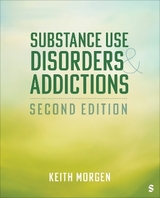
Substance Use Disorders and Addictions
SAGE Publications Inc (Verlag)
978-1-4833-7056-9 (ISBN)
- Titel erscheint in neuer Auflage
- Artikel merken
Based on a decade of research and theory, Substance Use Disorders and Addictions examines co-occurring psychiatric disorders as the norm with substance use disorders and addictions. With more than 20 years of experience in the field as a clinician, a researcher, a program developer, and an instructor, Keith Morgen encourages a holistic approach to working with individuals, using a single case example throughout the text to encourage the sequential application of concepts to co-occurring disorders. With DSM-5 diagnostic criteria, the 2014 ACA code of ethics, and 2016 CACREP standards integrated throughout, readers will benefit from this applied and cutting-edge introduction to the field.
"Keith Morgen presents an outstanding updated text on substance use disorders where students will be able to better conceptualize treating the substance use disordered client while adhering to common clinical work flows integrating the DSM-5, the ACA’s 2014 code, of ethics and the latest CACREP standards."
–Kevin A. Freeman, Mercer University
Substance Use Disorders and Addictions is part of the Counseling and Professional Identity Series.
Dr. Keith Morgen is a tenured Professor of Counseling and Director of the Graduate Counseling Programs at Centenary University where he is a prior recipient of the Distinguished Teaching Award. Dr. Morgen is the author of over 40 scholarly articles and book chapters in the areas of trauma, older adult mental health care, prison-based mental health/addiction issues, and co-occurring substance use and mental health disorders. In addition to Substance Use Disorders and Addictions, Dr. Morgen is also the co-author of the book Aging Behind Prison Walls: Studies in Trauma and Resilience (Columbia University Press) which was the 2022 recipient of the Society for Social Work and Research National Book Award. Dr. Morgen is the current President of the New Jersey Addiction Professionals Association (NAADAC affiliate), a member of the NAADAC older adult standards of care committee, and a former President of the International Association of Addictions and Offender Counselors (a division of the American Counseling Association). Dr. Morgen is a Licensed Professional Counselor (New Jersey), Approved Clinical Supervisor, and operates a counseling practice with clients diagnosed with co-occurring substance use/addiction and mental health disorders.
Section I
Chapter 1: Substance Use Disorder and Addiction: Basic and Brief Psychopharmacological and Neuropsychological Review
Central Nervous System
Brain Areas Associated with Substance Use and Addiction
Psychopharmacology: Basics
Interface Between Substance Use, Neuropsychology, and Psychopharmacology: Basic Considerations
Neuropsychology and Counseling Issues
Section II
Chapter 2: Interviewing, Screening, and Assesment
Purpose of Interviewing, Screening and Assesment
Content of the Interview
Screening and Assessment
Special Populations
Chapter 3: Diagnostic Issues
DSM-5 Overview for Substance Related Disorders
Co-Occurring Psychiatric Disorders
Process Addictions
Special Populations
Chapter 4: Treatment Modalities and Client Placement
Detoxification Services
Inpatient Treatment
Outpatient Treatment
Establishing the Appropriate Level of Care
Multicultural Elements of Treatment Placement and Planning Co-Occurring Levels of Care
Logistics of Treatment Planning
Drug Courts
Special Populations
Section III
Chapter 5: Motivational Interviewing
General Motivational Interviewing Content
Motivational Interviewing Spirit, Principles, & Processes
The Nuts & Bolts of Motivational Interviewing
When is a Client Ready for Change?
Meta-Analyses of Motivational Interviewing: Two Examples
Special Populations
Chapter 6: Cognitive Behavioral Therapy
Cognitive Behavioral Therapy Basic Elements
Cognitive Model of Substance Use
Cognitive-Behavioral Session
Examples of Some CBT Techniques
Rational Emotive Behavior Therapy
Meta-Analyses of CBT Effectiveness with Substance Use Disorders: Two Examples
Special Populations
Chapter 7: Family Counseling Interventions
Basic Family Counseling Concepts
Bowenian Theory
Sequential Family Addictions Model
The Addicted Family
Meta-Analyses of Family Systems Interventions: Two Examples
Special Populations
Chapter 8: Existential Counseling
Existential Counseling and Substance Use Disoders
Basic Concepts
Theory of Counseling
Meta-Analysis of Existential Counseling: An Example
Section IV
Chapter 9: 12-Step Philosophy
The 12-Steps and Traditions
Overall Philosophy of the 12-Steps
12-Steps and Counseling
12-Step Themes
12-Step Membership and Meeting Basics
Special Populations
Chapter 10: Relapse Prevention Theories
Basics of the Relapse Prevention Idea
Marlatt’s Model
Dynamic Model of Relapse
Gorski’s CENAPS Model of Relapse Prevention Therapy (CMRPT)
Matrix Model
Special Populations
Chapter 11: Substance Use Disorders and Addictions Couseling Supervision
Overview of Supervision in the Substance Use Disorders and Addiction Counseling Profession
Role of Supervision
Models of Counseling Supervision
Supervision Models Specific for Addictions Counseling
Ethical Concerns Relevant to Addictions Counseling Supervision
| Erscheinungsdatum | 15.09.2016 |
|---|---|
| Reihe/Serie | Counseling and Professional Identity |
| Verlagsort | Thousand Oaks |
| Sprache | englisch |
| Maße | 187 x 231 mm |
| Gewicht | 580 g |
| Themenwelt | Geisteswissenschaften ► Psychologie ► Klinische Psychologie |
| Geisteswissenschaften ► Psychologie ► Sucht / Drogen | |
| Medizin / Pharmazie ► Medizinische Fachgebiete ► Psychiatrie / Psychotherapie | |
| Medizin / Pharmazie ► Medizinische Fachgebiete ► Suchtkrankheiten | |
| Sozialwissenschaften ► Pädagogik ► Sozialpädagogik | |
| Sozialwissenschaften ► Soziologie | |
| ISBN-10 | 1-4833-7056-9 / 1483370569 |
| ISBN-13 | 978-1-4833-7056-9 / 9781483370569 |
| Zustand | Neuware |
| Informationen gemäß Produktsicherheitsverordnung (GPSR) | |
| Haben Sie eine Frage zum Produkt? |
aus dem Bereich



